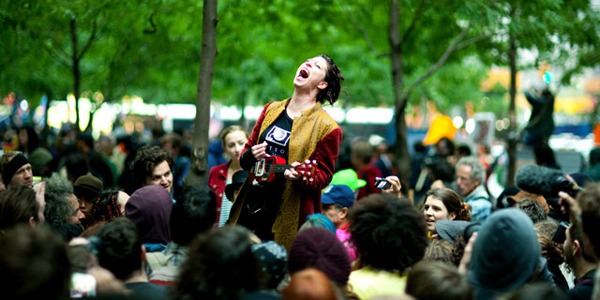on hitting a million twitter followers.
dear all y’all,
i have a million followers on twitter now.
i’d like to share some things, some recent dot-connections, with you.
it’s long, so take your time reading it. here’s a youtube/spotify playlist to guide you through…
• “turn! turn! turn!” – the byrds (youtube/spotify)
• “if i had a hammer” peter, paul and mary (youtube, live/youtube, pete solo live/spotify)
• “classic girl” – jane’s addiction (youtube/spotify)
• “where have all the flowers gone?” – pete seeger (youtube/spotify, pete solo/spotify, band)
i figure it’s a four-song read.
as i wrote this, i was about to board a plane to escape the frigid temperatures of boston and chain myself to a chair next to my editor/book-doula until this fucker is finished. i’m in the hardest editing part right now and i just couldn’t do it in my place in boston, surrounded by ghosts, dirty clothes, friends, commune living, and sleet. head asploded with distraction.
it was only a little over five ago that zoë keating and neil gaiman convinced me to start using my account (sean had locked down my name when twitter was in its infancy but i didn’t start wandering in until late 2008). neil loves telling this story and it’s so fucking embarrassing: it was a few weeks after that, that i learned you could actually press the little “@” symbol and SEE WHAT OTHER PEOPLE WERE WRITING TO ME. until then i’d only been sending out bottle-messages into the abyss, wondering that all this fuss about twitter was about. it was an astonishing revelation. LOOK. AT. ALL. THESE. PEOPLE. holy shit.
soon after, i held my first spontaneous twitter THING – a pillow fight in austin TX during SXSW which was attended by about 50 people who brought their own pillows and, on the corner of 6th and san jacinto, lovingly clobbered the shit out of each other.
to everything there is a season.
turn.
turn
turn.
on the flight from melbourne to vancouver a few weeks ago, i picked up a copy of australian rolling stone to read the pete seeger obituary.
(sadly, it doesn’t seem to be online or i’d link it.)
he wrote that song. it was covered, and popularized, by the byrds.
i’d heard he died a few weeks before, like so many other deaths, by looking down at my twitter feeds and hearing it from someone who thought i’d want to know.
i did not hear it from the radio or the television.
he was 94.
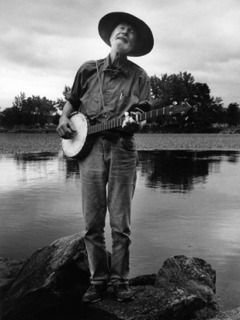
(photo via chris felver for getty images)
from the online edition:
“A tall, strapping figure known for his crisp-as-a-mountain-stream singing and banjo playing, Seeger was also a walking, talking, strumming embodiment of the connection between folk song and leftist politics. Throughout his career, he participated in pro-union and civil rights events and protested wars and nuclear power. For his trouble – and his membership in the American Communist Party – Seeger was blacklisted by the House Un-American Activities Committee in the Fifties; to make ends meet, he had to play sometimes four concerts a day, for $25 each.
‘I still believe the only chance for the human race to survive is to give up such pleasures as war, racism and private profit,’ Seeger told RS in 1979, beliefs he held until his death.”
certain kinds of sharing are now instant, and free, if you’re lucky enough to have a mobile phone and don’t live in turkey (etc).
the plane took off, and i read. and, maybe it was the altitude, but i found myself crying.
i knew the basics about pete seeger, i knew which “important” folk songs he’d written, and
i knew he “mattered” as a folk hero.
but i didn’t know some of the deeper stories.
i’d had a similar experience about a year ago, again (crying, blame the fucking altitude) on a plane, watching an hour-long documentary on woodie guthrie.
i’d known the basics, not the details.
i hadn’t how much of a joker he was. how revolutionary folk was before it was vanilla-fied.
i didn’t know how evil and subversive “this land is your land” was considered by certain people.
in short: i knew he was pinko, but didn’t know how fundamentally punko he was. pete seeger, too.
i, like many musicians with my kind of background, always dismissed folk as boring.
to be fair, my personal exposure to “folk” as a teenager was mostly older, cranky people wearing sandals with emotionally conservative, very sincere, left-wing agendas strumming their guitars at craft fairs and open mics in the suburbs. it seemed boring and lifeless. i wanted nothing to do with it. none of it seemed relevant. even when they were playing the (what i now consider) bad-ass songs of woodie guthrie, pete seeger, and bob dylan, none of it sounded vital…those words managed to have lost their magic in translation. i could not draw a line between folk – what they were – and punk/alternative, which is was what i was at fifteen. godammit.
we sang “this land is your land” in grade school. it was one of those songs that adults in the US makes you sing and it wasn’t any different from the other songs we sang in music class, some of which, to be sure, were very cool (some, not so much). i can dredge from my memory: “the rose”, “octopus’s garden”, and “there’s a hole in the bucket”…
and then there was “my country ’tis of thee”.
but we never compared and analyzed the lyrics.
if i’m ever a grade school music teacher, i’m going to spend an entire class comparing and contrasting “this land is your land” with “the star-spangled banner” and “my country ’tis of thee”.
it will be an only-slightly veiled lesson in imperialism.
i will also not let the children text or facebook during class.
oscar wilde once wrote: “all bad poetry is sincere”.
i think that’s part of what i hated, or what i didn’t get. the “sincerity”.
i spent my teenage years steeped in sarcasm, openly turning up my nose at anything i considered simple, literal moralistic folk-song lyrics lest they give my own “serious” songwriting a communicable, tie-dyed rash. ironically, at the same time, i actually loved sincere folk music. i loved the music of the sixties. i actually BOUGHT “FREEDOM ROCK” (i am not kidding) and played those two CDs into the ground. i was a living contradiction – an angsty punk rock teenager who wanted everybody to love each other and couldn’t reconcile those feelings.
i’ve changed.
pete seeger co-wrote “if i had a hammer”, which became a hit when peter, paul and mary covered it.
(he also wrote one of my favorite folks songs “where have all the flowers gone”. oh lord that song.)
i went to take part in a NYC benefit for VT disaster relief.
and peter yarrow – from peter, paul and mary – showed up.
we rehearsed and sang “if i had a hammer” together.
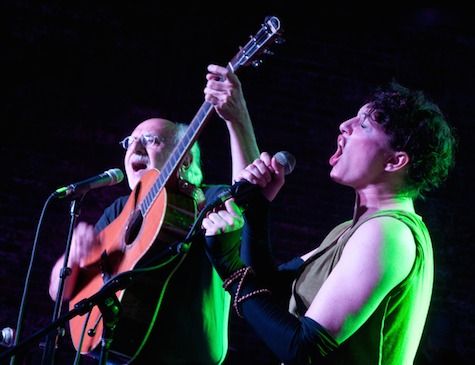
(photo by bob eddy)
if you don’t know it, it goes a little something like this:
“If I had a hammer
I’d hammer in the morning
I’d hammer in the evening
All over this land
I’d hammer out
danger
I’d hammer out
warning
I’d hammer out
love
between
My brothers and my sisters
Aaaaaall over this land”
it felt powerful, singing that sincere goddamn folk song, i’ll tell you.
danger.
warning.
love.
the benefit was at the brooklyn bowl, and since there weren’t really any dressing rooms, the venue had rented a little trailer to sit outside on the street so the performers had a place to go.
peter said to me:
“i want to play you a song i wrote!”
“just me?” i asked. i was there with superkate, my assistant, who was helping everybody out that day at the show.
“superkate too! bring her in!! here. sit down. listen. i love this song, i’ve been traveling around playing it at schools for little kids!!”
and kate and i sat in the trailer, and he tuned his guitar and he played us a really beautiful (and oh my god, sincere) song called “don’t laugh at me”…
a rallying cry against bullying.
“I’m the beggar on the corner
You’ve passed me on the street
And I wouldn’t be out here beggin’
If I had enough to eat
And don’t think I don’t notice
That our eyes never meet
Don’t laugh at me
Don’t call me names
Don’t get your pleasure from my pain
In God’s eyes we’re all the same
Someday we’ll all have perfect wings
Don’t laugh at me…”
and when peter was done, he looked at me and superkate and said:
“you like it?”
i’ve been a touring rock musician for almost fifteen years, and i can count the number of times that my touring mates have sat down and asked “hey i wrote a song can i just share it with you?” much less “do you like it?”
we’re all scared shitless of each other.
maybe that’s the problem.
that is folk.
sharing your story. through song, with people, with less fear.
whatever people.
any people.
all the peoples.
the peoples who are there at the time.
one peoples.
one thousand peoples.
one million peoples.
that moment changed me a little, when i think about it now. and i started to see the bridges between folk and punk, and that there wasn’t a clear boundary at all.
billy bragg? violent femmes? elvis costello?
note:
peter yarrow had (and has) no twitter account.
a lot of those older musicians don’t.
that benefit had been announced, a week before, that he was going to be at the benefit, but nobody from his fanbase knew he was there.
because the benefit had no direct reach to those people. nor did he.
the no big newspapers were announcing it. so we were playing, mostly, to my fans.
which felt bizarre. because peter is way more famous and highly-regarded than me.
but i had…520,000 twitter followers.
we don’t look like a bunch of hippies marching on washington, we’re not creating a spontaneous be-in somewhere in central park in 1969.
or maybe we are.
to quote jane’s addiction (an old favorite of mine):
“they say:
those were the days
but you know
for us
in a way
These Are The Days”
since that night with peter yarrow, i’ve started playing my songs for my friends more often.
in rooms, on buses, in airports. wherever.
when you think about it: that is the purpose of music. no? yes?
to share it?
do you like it?
do you relate?
when i met glen hansard a few weeks ago in australia, we played each other’s songs.
just because we wanted each other to hear them.
the house parties have changed this for me, too – there’s an intimacy in just playing in a room full of people, hootenany-syle, in the safe haven of a home, with no other agendas in the air other than to commune, share, make music, talk, be together…listen to each other.
but we found each other through twitter, through facebook. those were the portals through which we had to crawl to get to the wood-stock like field.
passing the storytelling stick around.
that is folk. is it punk?
i don’t know.
i know:
i don’t care about selling records.
i dont care about being famous.
i care about feeling connected.
famous is only helpful as much as it can bring me what i want:
communion with people.
i don’t care if the media likes me.
i don’t even care if YOU like me.
(except that, in my own narcissistic way, of course i do. i am human and i need to be loved.)
here’s what i really care about:
i care that i can reach a hand out in the darkness and feel another hand.
i care that i have a friend nearby to share a bottle of wine with at a small table in whatever city I’m in so we can discuss the flood of our hearts.
or a community that can provide the equivalent on a dark night, over the internet.
sometimes you forget.
twitter is just a BUNCH OF PEOPLE.
in the same rolling stone issue conor oberst says, in an interview:
“I don’t know if it makes me an asshole to not want to talk to my fans. But I’m not going to sit on a fucking computer and try to talk to some fucking 16-year-old in wherever-the-fuck. I try to remind myself to be grateful. I’m not a fucking superstar. I’m not a bazillionaire. I get to do my shit, and for the most part people leave me alone. And that’s the way I want it.”
and pages later, my old pal Annie aka St Vincent:
“People feel so compelled to document their every movement that you start to lose track of what’s actually meaningful.”
looking at that, it seems the feeling about the Internet is divided between those who have experienced the concrete accuracy of a well-aimed tweet at the heart of a real-time emotional, human situation and those who think that twitter is about “what I ate for breakfast” or pandering to your audience.
it’s not.
it’s not.
here’s the thing that struck me hardest from the article, wording here from wiki:
“In the 1950s and, indeed, consistently throughout his life, Seeger continued his support of civil and labor rights, racial equality, international understanding, and anti-militarism (all of which had characterized the Wallace campaign) and he continued to believe that songs could help people achieve these goals. With the ever-growing revelations of Joseph Stalin’s atrocities and the Hungarian Revolution of 1956, however, he became increasingly disillusioned with Soviet Communism. He left the CPUSA in 1949 but remained friends with some who did not leave it, though he argued with them about it.
On August 18, 1955, Seeger was subpoenaed to testify before the House Un-American Activities Committee (HUAC). Alone among the many witnesses after the 1950 conviction and imprisonment of the Hollywood Ten for contempt of Congress, Seeger refused to plead the Fifth Amendment (which would have asserted that his testimony might be self incriminating) and instead, as the Hollywood Ten had done, refused to name personal and political associations on the grounds that this would violate his First Amendment rights: “I am not going to answer any questions as to my association, my philosophical or religious beliefs or my political beliefs, or how I voted in any election, or any of these private affairs. I think these are very improper questions for any American to be asked, especially under such compulsion as this.”
and from that point, for about the next ten years, pete seeger was blacklisted from playing on national US television, because his beliefs were considered too radical.
he famously wasn’t allowed to appear on “hootenany”, the folk-style US national television show named after a phrase that seeger and woodie guthrie themselves had coined.
people thought this was ridiculous – it’d be like prince being banned from a national US television show called “three love generations of american funk heroes”.
instead, pete slogged along, respected as ever, doing the college circuit. it took ages for his comeuppance to arrive.
he went live on air in 1963 due to a shift in the wind, (and popular demand) on the smothers brothers.
and
he sang:
“It was back in nineteen forty-two,
I was a member of a good platoon.
We were on maneuvers in-a Louisiana,
One night by the light of the moon.
The captain told us to ford a river,
That’s how it all begun.
We were waist knee deep in the Big Muddy,
But the big fool said to push on…”
which was – to anybody paying scant attention to the metaphor – effectively calling out robert mcnamara, the secretary of defense, as a goddam fucking fool for keeping the states involved in vietnam.
from tom morello’s piece, which is the closest thing i can find:
“But my favorite Pete Seeger moment in history is when he was booked on the Smothers Brothers Show. The network initially canceled his performance because of his political affiliations. But the Smothers Brothers stood up for him. Months later, they had him on to play “Waist Deep in the Big Muddy.” Check it out on YouTube: it is as angry as any Rage Against the Machine song. With poetic, razor-like precision, he vivisects the cruel foolishness of the Vietnam War – all with one banjo and one vision for a better world that he was willing to put himself on the line for. It’s something that I return to for inspiration in my own work.”
(click here to watch if the embed below doesn’t work)
here’s the question:
what if pete seeger (or peter yarrow, or woodie guthrie) had not been reliant on the whims of network television to share
the message
the music,
with the country?
…with the world?
in the last few months, i’ve been writing a book that’s been throwing my whole vision of twitter into perspective.
twitter profoundly changed my landscape. it created a new realm of instant and vital true connections.
it changed my relationships.
it deepened the way i trusted people.
it changed my music, my art.
it changed my life.
a few nights ago, i played twitter-switchboard-operator and shared people’s burning tech-problem-questions, and watched others reach out to help them. today i just decided to throw out a random request for people to ask for things they needed, and i threw their requests back into the world. nothing life-changing, just…advice for philosophy books. people needing models. people needing housing. basic community bulletin board stuff. but this is the stuff of twitter that i love so much. tightening all these people together. i owe them.
when the boston marathon bombing happened, i spent an entire day on twitter, talking with and crying with people, sharing news, sharing photos, not feeling alone.
when my kickstarter went live, it was twitter that spread the word first.
when my college piano teacher wrote me a piece of hate mail, it was to people on twitter that i posted the link, it was people on twitter that reminded me to breathe, and it was someone on twitter who did a google and found out that the teacher had actually had a terrible stroke and blown a mental fuse. and there we all were, astounded together. i was alone in a bed, with my hand feeling tightly held.
i don’t feel like i have one million “followers”.
i feel like i am profoundly connected to one million people, and that’s different.
i use my twitter feed to listen as much as i use it to talk, and that is exactly where twitter gets its true power.
if pete seeger had used twitter, he may well have been sharing pictures of sunsets over the hudson from his backyard in beacon.
and his cats.
but who cares, because i think he most definitely would have also would have been saying
LOOK at this tool that we can use to
find each other!
help each other!
educate each other!!!
SHARE ART
and
FEEL with each other.
we all talk, and we listen.
i listen to my fans, i listen to the other artists i admire, i listen to the artists i don’t admire, i listen to and follow people with opposing political views, i debate, i observe, i wake up every morning and turn on my twitter feed with a sense of absolute reverence.
reverence for the fact that you, me, and the rest the world are not disconnected.
that neither CBS, NBC, MTV nor the NSA get to decide whether or when we talk to each other, or what we talk about.
reverence and awe for the fact that “the news” is no longer “they’re all saying…”, but rather “we’re all saying.”
that the deep things and the messages we care about are shared,
openly,
from you
to me
to you
to you,
to him to her
and through the whole wide world,
giving no fuck about what “the authorities” have to say about it.
that is folk.
and…
that is punk.
there are lots of people trying to steer the boat of information-sharing in different directions.
wikileaks. the recent twitter-ban in turkey. snowden. the RIAA. the DMCA.
we cannot, should not, MUST NOT take our freedom to be connected with and to each other for granted.
cats on skateboards, hooray. fantastic.
but this is about something so much fucking bigger.
this is a whole new moment
of
danger.
warning.
love.
let’s never take it – or this connection we’ve found with each other – as a given. it’s a miracle.
and i mean that absolutely, one hundred percent fucking…sincerely.
i am imperfect in every way
much like you
i cannot be what you want
i cannot DO what you want
but
i am here, trying to connect us all in the dark, looking for a hand.
use me.
use me.
USE ME.
otherwise i’m use-less.
this is only the beginning.
these are the days.
love to you all,
AFP
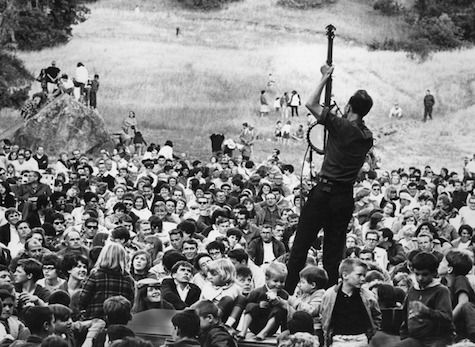
(photo via the weinstein co.)
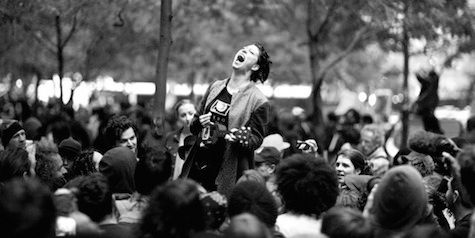
(photo via katie sokoler)
